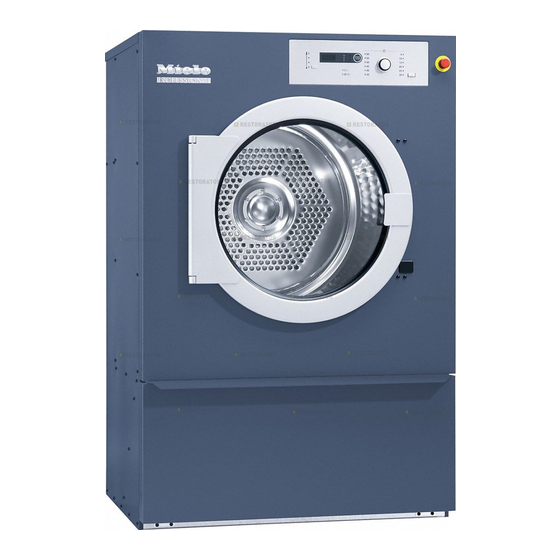Miele PT 8251 Manuel d'utilisation - Page 10
Parcourez en ligne ou téléchargez le pdf Manuel d'utilisation pour {nom_de_la_catégorie} Miele PT 8251. Miele PT 8251 26 pages.

Drying
Sort the laundry
Not all textiles are suitable for machine drying.
Please read the instructions given on the garment
care label.
The meaning of the care symbols:
q = Dry at normal temperature
r = Dry at low temperature
s = Do not tumble dry
Sort the laundry according to fibre type and weave to
ensure even drying.
,
There is a danger of fire with the following
and they must not be dried in this machine (with
the exception of those fabrics which can be dried
in the Special Programmes specifically designed
for them):
- articles containing foam rubber, rubber or rubber
like materials,
- articles which have been treated with inflamma-
ble cleaning agents,
- articles which have been splashed with hair lac-
quer, hair spray, nail varnish remover etc.,
- articles soiled with oils, grease and other resi-
dues e.g. kitchen linen and spa linen,
- articles contaminated with residues such as wax
or chemicals, e.g. mops and floor cloths,
- articles with damaged padding
- articles soiled with oils or grease which have not
been sufficiently washed beforehand. Use
heavy-duty detergents where necessary to clean
very dirty garments, e.g. workwear. If necessary
consult the detergent manufacturer for advice.
The following textiles should not be machine
dried:
Woollens and wool blends as these tend to matt and
shrink. Partially dry these using in the "Woollens"
programme.
Pure linen tends to roughen if tumble dried. Please
follow instructions given on the care label.
Important:
Textiles with large metal accessories such as buck-
les, hooks and zip tags should be placed in a laundry
bag or a pillow case before drying. This is to protect
the drum from scratches and dents during drying.
Garments with closed metal zips can cause the sen-
sor electrodes in the drum ribs to be bridged. This
can cause the drying process to go on for too long, or
to not finish at all. Open zips before drying.
Loopknit and woven textiles (e.g. T-shirts and under-
wear) have a tendency to shrink depending on their
quality. This is made worse by over-drying. Do not
use the "Cottons dry plus" for these textiles.
10
Starched laundry can be machine dried. Select the
most appropriate programme for ironing by hand or
machine.
Sort the laundry according to the level of dryness re-
quired. It is not necessary to sort according to size.
Duvet covers and pillow cases should be closed to
prevent smaller items rolling up inside them.
For greater economy dry a full load. Underloading is
uneconomical. Overloading will impair the drying re-
sult and the laundry finish.
Rinsing the laundry using hot water in the final rinse
helps to reduce the residual moisture level, and the
residual heat in the laundry will help keep processing
time down, thus saving energy.
